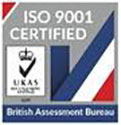We walk through them so many times a day that we don’t even think about it, but there are so many different types of door available, each with unique characteristics that make them more suitable for their job – and less suitable for others.
Choosing doors for an industrial property, a commercial location, or a public space, can be complicated – with so many practical considerations to be made, and options for the end product available, how do you know what to choose?
We’ve put together some initial questions to ask yourself and things to consider, so you can get a better idea of what you might need. Remember, any good door supplier will be able to make something bespoke to your exact specifications, so don’t settle for something that’s just not quite right.
Internal or external?
First question – do you need internal or external doors, or both? Many doors, particularly steel doors, can do both, but they may also be a bit heavy or bulky for internal doors that are in constant use.
When it comes to roller shutters, there are smaller shutters with unobtrusive storage available that are ideal for internal use.
However, doors built specifically to act as internal doors are usually smaller, and potentially less secure – while they may feature anti-pick locks, for example, they’re less able to resist a ram raid. Selecting different doors for internal and external use is usually recommended.
Enough space to open and close
Hinged or garage-style up-and-over doors will have a footprint when you open them – so there are space considerations to be made, particularly in a busy environment with vehicles coming in and out.
For example, if vans are parking nearby for loading and unloading, these types of doors will restrict how closely they can park.
A roller shutter or sectional overhead door opens vertically, rather than swinging out, so may be your best option in this instance.
Traffic (both people and vehicles)
How regularly will your doors be opened and closed? If it’s going to experience a high level of foot traffic, then it needs to be sturdy enough to withstand constant usage, with plenty of slamming involved.
However, depending on the nature of that traffic, it can’t be too sturdy – for example, your warehouse staff might all be able to open and close a heavier door with ease, but using the same one in an area accessed by the public regularly means some might struggle with it.
When it comes to larger industrial doors and shutters, the level of traffic may determine the speed of your door’s opening mechanism – if a large shutter takes time to fully open and close each time, it can add up to plenty of lost minutes – and even hours – of time, particularly for delivery drivers, for example.
In these cases, high speed doors that can open and close safely in seconds, may be exactly what’s needed.
Safety and security
There are a whole range of safety and security considerations to be made – you might need internal fire-resistant doors or fire exits in certain locations, for example, in order to satisfy health and safety regulations.
Returning to the issue of traffic, there are also doors with non-protruding mechanisms available – this means that, when there’s a big rush of people using a door at the same time, there’s less risk of injury from something sticking out.
When it comes to external doors, your insurers may have specific regulations that you need to satisfy. Security doors with anti-bump, snap and pick locks can add additional barriers to unwanted entry – and you may need to support this with extra features such as window grates.
Environmental factors
The environment you’re working in can also have an impact on the ideal door for any given scenario. For example, excessively noisy environments may require insulated doors to keep the volume down outside – while insulation is all but essential for insulated units.
High-speed doors are also useful in temperature-controlled environments – when the door’s open, heat is lost, and a faster closing mechanism keeps that time down to an absolute minimum.
Moisture can also damage a door over time – we originally developed our marine-grade doors for offshore locations such as oil rigs, but they have also proved to be excellent additions to anywhere with a great deal of rainfall, by the coast, and even swimming pools.
Industry needs
Many of our doors are designed with specific environments and industries in mind, tailored to address specific issues that you might have with a more standard one-size-fits-all door.
From the afore-mentioned marine-grade doors to sports hall doors, as well as shutters designed specifically for commercial and retail premises, there are always extra features that can make your door better-suited to its environment.
If you’re struggling to find a door that does exactly what you need it to, or just need some advice on what the best option is for your building, then don’t hesitate to get in touch with us – we’ll be more than happy to help!
Back to all blog posts







